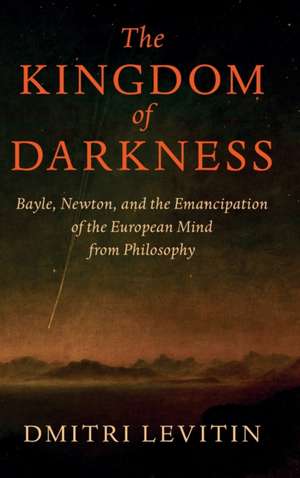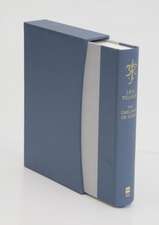The Kingdom of Darkness: Bayle, Newton, and the Emancipation of the European Mind from Philosophy
Autor Dmitri Levitinen Limba Engleză Hardback – 30 mar 2022
Preț: 574.76 lei
Preț vechi: 624.74 lei
-8% Nou
Puncte Express: 862
Preț estimativ în valută:
109.99€ • 114.14$ • 91.94£
109.99€ • 114.14$ • 91.94£
Carte tipărită la comandă
Livrare economică 15-29 martie
Preluare comenzi: 021 569.72.76
Specificații
ISBN-13: 9781108837002
ISBN-10: 110883700X
Pagini: 980
Dimensiuni: 158 x 236 x 56 mm
Greutate: 1.58 kg
Ediția:Nouă
Editura: Cambridge University Press
Colecția Cambridge University Press
Locul publicării:Cambridge, United Kingdom
ISBN-10: 110883700X
Pagini: 980
Dimensiuni: 158 x 236 x 56 mm
Greutate: 1.58 kg
Ediția:Nouă
Editura: Cambridge University Press
Colecția Cambridge University Press
Locul publicării:Cambridge, United Kingdom
Cuprins
Preface; Abbreviations and Conventions; Part I. Giving Up Philosophy: The Transformation of a System of Knowledge: 1. Giving Up Philosophy; 1.1. The Emancipation of Natural Philosophy from Metaphysics; 1.2. The Emancipation of Theology from Philosophy; 1.3. Reconstructing the Pagan Mind in Seventeenth-century Europe: A Historico-philosophical Critique of Pure Reason; Part II. Pierre Bayle and The Emancipation of Religion from Philosophy: 2. Pierre Bayle: A Life in the Republic of Letters; 2.1. Greece, Asia, and the Logic of Paganism. Cartesian Occasionalism as the only 'Christian Philosophy'; 2.2. The Manichean Articles and the 'Sponge of All Religions'; 2.3. Theological Method and the Foundations of Protestant Faith; 2.4. Virtuous Atheism, Philosophic Sin, and Toleration; Part III. Isaac Newton and the Emancipation of Natural Philosophy from Metaphysics: 3. The Formation of Newton's Natural Philosophical Project, 1664–1687; 3.1. After the Principia. Justifying a Science of Properties and the Invention of 'Newtonianism'; 3.2. The Queries to the Optice (1706). An Intelligent God, the Divine Sensorium, and the Development of an Anti-metaphysical Natural Theology; 3.3. The General Scholium: A Non-metaphysical Physics; 3.4. Newton's Kingdom of Darkness Complete; Part IV. Conclusion: The European System of Knowledge, 1700 and Beyond: Conclusion; Bibliography.
Recenzii
'This truly monumental study calls for a Copernican revolution in our understanding of Modernity: the European Mind, Levitin argues, was not transformed by the triumph of philosophy but by emancipation from it. The evidence and acumen with which Levitin advances his bold thesis are extraordinary and will provoke debate for years to come.' Maria Rosa Antognazza, King's College London
'In his extraordinarily erudite and broad-ranging study, Levitin compels us to rethink historiographic categories such as the Scientific Revolution, the Enlightenment and the rise of modernity in Europe by charting the contingent historical conditions that prompted a momentous, yet overlooked, disciplinary reconfiguration of early-modern natural philosophy and theology; namely, the emancipation of both scientific and religious thought from traditional metaphysics and philosophical rationalism.' Niccolò Guicciardini, Università degli Studi di Milano
'This is one of the most important publications in European intellectual history, not just of this year, but of the last decade.' Noel Malcolm, Books of the Year 2022, Times Literary Supplement
'In his extraordinarily erudite and broad-ranging study, Levitin compels us to rethink historiographic categories such as the Scientific Revolution, the Enlightenment and the rise of modernity in Europe by charting the contingent historical conditions that prompted a momentous, yet overlooked, disciplinary reconfiguration of early-modern natural philosophy and theology; namely, the emancipation of both scientific and religious thought from traditional metaphysics and philosophical rationalism.' Niccolò Guicciardini, Università degli Studi di Milano
'This is one of the most important publications in European intellectual history, not just of this year, but of the last decade.' Noel Malcolm, Books of the Year 2022, Times Literary Supplement
Notă biografică
Descriere
This transformative account of early modern intellectual life culminates with new interpretations of two of its leading minds: Pierre Bayle and Isaac Newton.


